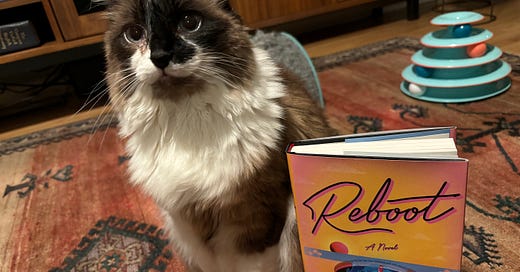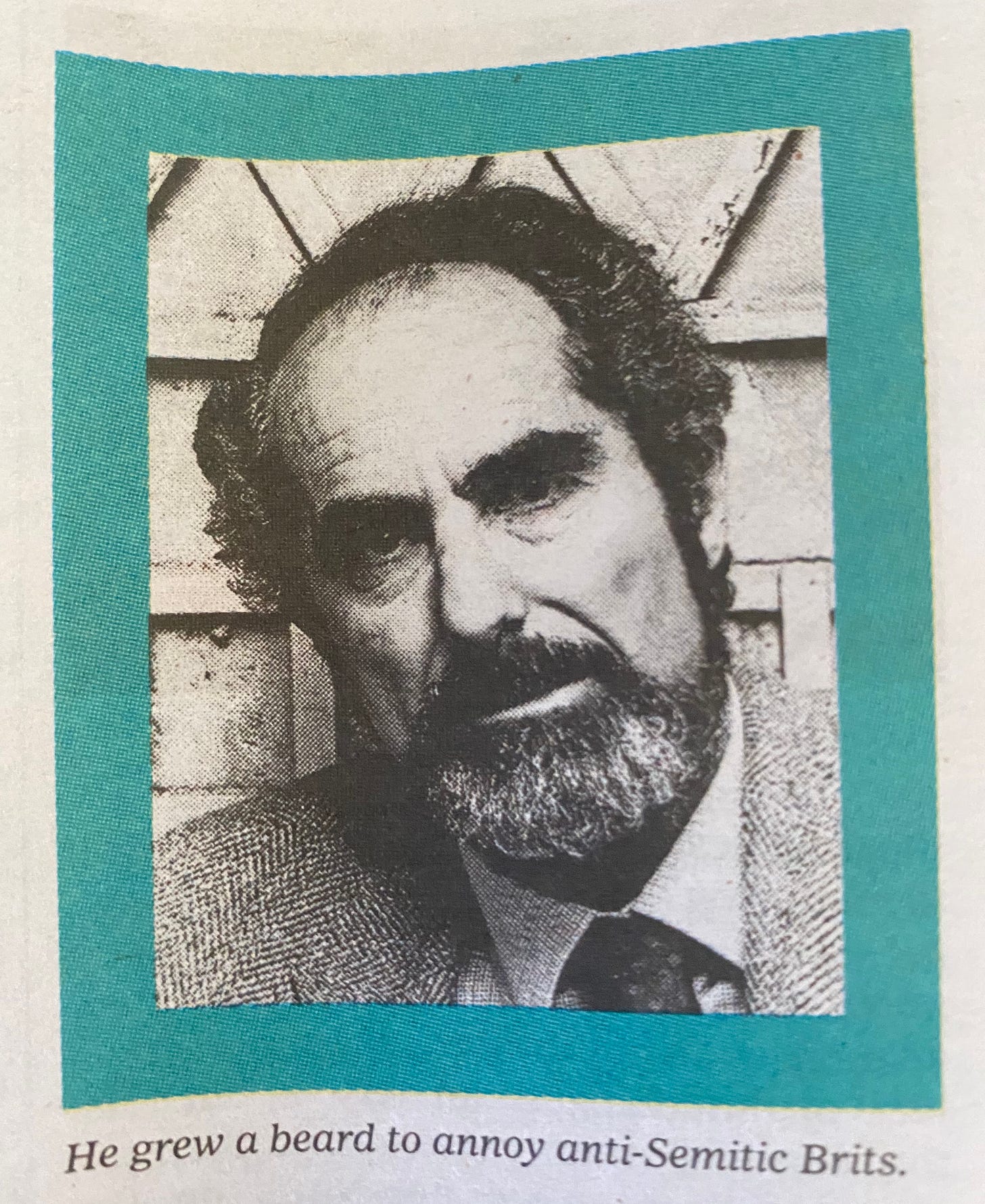REBOOT is here
And what are the odds that “roguelike” is the only word that you need me to define?
When I launched this newsletter, I said it would be monthly-ish. This has been a big month for me, so I’m doing two. On April 11, my profile of Low’s Alan Sparhawk was published by The New Yorker. Today, April 23, is publication day for Reboot, my second novel. I know I’ve been telling you that in every issue since January. But this week I’ve got a bunch of exciting new stuff to share—reviews, interviews, an excerpt—and I am going to shamelessly implore you for the last time to please please please buy a copy. (Future imploring will occur, but less often and with more shame.) I also want to remind you that the REBOOT SPRING TOUR is officially underway. I kicked things off this past weekend at the L.A. Times Book Festival. There’s now an official tour graphic, which is just below, but you can get more detailed info on any given event, as well as any changes or additions, by checking my website or my Instagram.
Now I’m going to round up some of the recent press that Reboot has gotten and say some pretty earnest, hopefully interesting, ultimately self-congratulatory things about the people and entities that published the pieces.
TL;DR VERSION:
“Shibboleth Gold,” an excerpt from Reboot, in N+1.
“The Pilgrim’s (Lack of) Progress, Or, Sorry I Took So Long to Finish My Novel, Or, On the Value of Restarting”, an essay in Lit Hub. (Title theirs; I submitted it as “The Author’s Apology for His Book.”)
In conversation with Adam Ross on The Sewanee Review podcast.
Interviewed by Lincoln Michel for his Counter Craft newsletter.
Reviews: New York Times Book Review; Bookforum; Washington Post.
I made you a playlist: “in rotation, April” kicks off with the biggest bop on the amazing new Charlie Parr album, Little Sun. There are a few entries linked to Reboot in variously obvious or obscure ways: “Silver Threads and Golden Needles”, this particular recording of “Goodnight, Irene”, the latest Guided By Voices, and Taylor Swift’s newfound interest in poetry. Her new record is weirdly both a little uneven and a little one-note. It has taken some deserved knocks—personally, I’d like to see her get over her infatuation with Lana Del Rey and go back to writing something we can sing along to, or even, hope of hopes, brush the dust off her banjo—but in this family we don’t turn on people because they’re TRYING SOMETHING, so I picked a B-side dirge with a title giving just enough Mazursky to raise an eyebrow. If you dig the Humbird song, clickthru to the new record, it’s great. “Kill Devil Falls” came on randomly the other day and I realized I’d never paid attention to the lyrics before because I’d only ever heard it live and also who cares. But the studio version is lyrically legible and, I think, a cleverly organized and economical story song. J.J. Cale cuz I’ve got Tulsa on the brain. More Mike Scott, Spiritualized, Townes, Robert Earl, and Japanese shoegaze—go figure. Thanks for listening.
TAYLOR’S VERSION:
“Shibboleth Gold,” an excerpt from Reboot, in N+1. My relationship with these guys goes back nearly to their founding. I was an intern at The Nation when they launched, and one of my bosses connected me to Ben Kunkel, who invited me to the issue #1 release party, and to a Vampire Weekend show sponsored by eMusic, which come to think of it might not have been an N+1 event at all but rather just been Ben being nice to me. I pitched them a review of the then-new Nirvana box set, With the Lights Out, and this became the first piece of serious writing that I ever published as well as my most impressive byline for years to come. It probably helped get me into graduate school. That reminds me: there used to be a line in Reboot where Molly Webster, explaining that the freelance rate she gets for writing pop culture hot takes doesn’t come close to covering her student loan debt, remarks “MFA vs. NYC?—Why not both!?!?” We cut the joke because my editor rightly found it too obscure, but old school heads know what I’m talking about. (As it happens, “Why not both!?!” is what I did, the former being the thing that made the latter possible.) It is always a privilege & thrill when my work appears in their pages/pixels, and I still think N+1 is one of the most impressive bylines you can have.
This essay for Lit Hub started its life as the preface to Reboot. I was going for a whole Amis-preface-to-Money-meets-Roth-preface-to-Operation Shylock thing that didn’t work out. I’m glad it found a second life here, though it’s worth noting that this is not the title I submitted it with. In my mind it is still called, pace Bunyan, “The Author’s Apology for His Book.”
Speaking of privilege & thrill, I got to have a conversation with my friend and colleague, Adam Ross, editor of The Sewanee Review, for the magazine’s podcast. I started writing for Adam not too long after he became SR’s editor. He’s published a number of my short stories, for which I am grateful, and I wrote a craft talk for him that will be out later this year. But he’s also given me the space and encouragement to do the kind of longform criticism that people say doesn’t exist anymore. If not for the grace of editors like him, those people would be right.
Lincoln Michel interviewed me for his Counter Craft newsletter. Lincoln and I came up in the writing world together and I’ve always been impressed by the way he brings his literary values to bear on his speculative instincts and genre enthusiasms. It’s easy to look around in 2024 and see why someone would do what he does, because his sensibility (broadly construed) is enjoying widespread popularity, critical acclaim, and commercial success: Kelly Link, Ed Park, Percival Everett, Charles Yu, Carmen Maria Machado, Karen Russell, Joshua Cohen, Marie-Helene Bertino, Catherine Lacey, E. Lily Yu—the list goes on and on. But Lincoln was ahead of the curve on this; as Alex Jones said in a slightly different context, he was “Out here on day one.” In fact, while I was listening to Justin Torres in conversation with Nadxieli Nieto at the L.A. Times Book Festival this weekend, it occurred to me that we’re living through a golden age of innovative and experimental literature, and it’s happening front and center of the industry and the culture. I thought, I should write an essay about this; then I thought, No, Lincoln should write an essay about this. Maybe he will? Maybe he already did? My point is that he’s exactly the kind of reader who I hoped would love Reboot, and it means a lot that he took the time to talk with me about how I wrote it.
There was a great review of Reboot by Joshua Ferris in the New York Times Book Review this Sunday. What a gift it is when they send the guy from the generation above yours who made his name with a DeLillo homage/burlesque to review your DeLillo homage/burlesque and he thinks you did a pretty solid job. You can read the whole thing here. This is my favorite part:
I write a lot of book reviews. It’s a big part of my identity as a writer, and a not inconsiderable part of how I make a living. Some writers don’t write reviews and/or don’t read reviews of their own work. I get why. But I do both. I’m less concerned with whether a book review is positive or negative than with the depth and quality of engagement between the critic and the work. I try to bring good faith and my best attention to the criticism I write, whether it’s 600 words in a daily paper or 6,000 words for a literary quarterly. To me, that’s what criticism is: a record of good attention paid in good faith. To see my fiction treated with real rigor and care, to read the record of someone else’s sojourn through the world I dreamed into being and lived alone in for so long, is incredibly rare and truly special. And to be blunt, it is not something I’ve experienced very often in my career. Most writers don’t. And just to show I’m serious, here’s a pretty negative review by Sam Sacks in the Wall Street Journal. I disagree with his verdict, obviously, but his positions are hardly indefensible—especially the part where he praises my intelligence and says I’ve updated Philip Roth’s notion of “the indigenous American berserk.” On that much we can agree to agree.
Still, one likes to be liked, and prefers praise to criticism. Here is Angelo Hernandez-Sias’ “Hollywood Babble On” in the new issue of Bookforum, another one of my favorite magazines to read and in which to publish. I’m helping them launch the new issue on May 3, and just in case that fact has you thinking this whole thing smells a little funny, let me just say that they didn’t tell me a review was even coming, let alone who was writing it, and they didn’t ask me to read at their party until after the piece came out. Michael Miller has been a friend and mentor to me since he was at Time Out New York back when that existed, and I’ve written more pieces on a more consistent basis for him than any other editor I’ve ever worked with. But he plays fair. Anyway, Angelo’s piece is one of the most substantive reviews my work has ever gotten and I’m grateful to him for it. Here’s the same thing that the WSJ critic found so pointless and irritating as explained by somebody who thought it was worthwhile and cool:
And speaking of the most substantive reviews I’ve ever gotten, here’s Mark Athitakis in the Washington Post. He calls the novel “a very serious story about the perniciousness of conspiracy thinking, wrapped in a very funny yarn about the shallowness of celebrity culture.” What else could you ask for? Well, how about this: he goes on to say that I am “funnier than DeLillo”, which, well—holy shit. He notes that this “may seem like faint praise” but it doesn’t feel that way to me. DeLillo can be extremely funny! Frankly, I have my own doubts as to whether his assertion is true, but I’m grateful for it either way. Moreover, this review sees very clearly not just that DeLillo is a big influence on this novel, but which DeLillo and why. Although Cosmopolis is the novel that Reboot name-checks and riffs on (and though there are a few Underworld Easter Eggs in the text) it was DeLillo’s quartet of mid ‘70s novels—End Zone, Running Dog, Players, and especially Great Jones Street—that I looked to most often for guidance and inspiration. Without Bucky Wunderlick, there is no David Crader, who, in one draft of Reboot, was trying to convince Shayne to work with him on an adaptation of Great Jones Street and had memorized Bucky’s “lone mellow promise of an island” speech from the end of GJS to help sell the idea. The version of David I ultimately settled on wouldn’t be interested in doing that, but you can find traces of GJS is in David’s meditation on the nature of fame and Grace’s more cryptic/oracular pronouncements when he is talking with her at her father’s grave.
OK I think that’s it. Thank you to everyone who has helped me bring this book into the world. If you’re reading this, that means you.












I got my copy TODAY!
DeLillo is funny! Master of the American deadpan, especially in the 70s novels you cite. Excited to read the book!